1st February 1942 (Sun)
Ships Log "Left Kunming, down the Burma Road by truck, destination Lashio 1250 Km. 1st Lt of 07 Sub-Lt Gee left in Kunming to be taken by plane to Chungking for Cipher work in British Embassy.
PM. Arrived at Tsuyang for night 192 Km down Burma Road. Contacted 3rd contingent of British guerillas (All Australian)" [5]
The convoy proceeded down the Burma Road, the only overland route into and out of China,where the US Lend-Lease supplies came in for the embattled Chinese government of Generalissimo Chiang Kai-shek in their fight against the Japanese and Communists.
After 192 km the convoy stopped at the small village of Tsuyang where they were billeted for the night with a 3rd contingent of the 204 Military Mission. 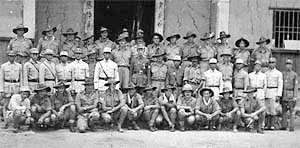 [5]
[5]
L/St Charlie Evans "The Burma Road was the most wonderful site I have ever seen, stretching out in a long white ribbon, trailing along for miles and miles through that amazing country.” [12]
Lt Kennedy RNVR "We were ready to leave and Gandy warned us to keep a good look-out for aircraft on the next stage. Apparently the Japanese-controlled radio at Bangkok had announced that the British party which had escaped from Hong Kong would never get out of China.
Most of us had read romantic accounts about 'China's life-line' and we were now to see for ourselves this astonishing feat of engineering, driven through some of the most difficult terrain in the world in less than a year." [9]
PO Buddy Hide "Although some of the views were breathtaking it was a nightmare, what with the several inches of dust, the real tortuous S-bends, and the road barely wide enough to pass an oncoming vehicle, and the several thousands of feet drop." [21]
The party soon began to regret having swapped their Chinese padded jackets with the commando's for shirts and shorts as they climbed steadily higher and higher. The road peaked at over nine thousand feet (2743m) with heavy frost.
The views over the plains below were stunning and kept the party in a jovial mood. The overnight stops were a trial in itself with little or no electricity and primitive communal amenities.
PO Buddy Hide "We were the only sailors to have travelled the whole length of it. It is impossible to travel after dark on this road; we saw a lorry smashed every two miles on average." [21]
Buddy Hide was unaware that the river gunboat HMS Falcon stationed at Chungking was paid off in March 1941 and her crew travellelled overland to Rangoon in Burma via the Burma Road. [102]
L/St Charlie Evans "All along the road there were hundreds and hundreds of Chinese women carrying baskets of stones to fill up the many shell holes and by the side of the road there was an endless number of Lorries overturned by bombing or by accident on that very narrow road.” [12]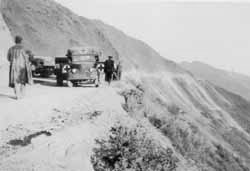
L/S Les Barker "The road was very bad in places and it does shake one up a lot. Sometimes we climb up mountains thousands of feet and the road twists and turns too many times to count, sometimes leaving sheer drops of thousands of yards. To fall would be suicide. Sometimes we had to stop to let other trucks pass. It was very dangerous. Plenty of Lorries which had failed to negotiate turns had crashed over the precipices... Now passing through the Hunghai pass and at the top of this pass we get a magnificent view of an immense plain which is known as the Muti plain. It just looks like a patchwork quilt from here." [24]
2nd February 1942 (Mon)
It was 700 miles from Kunming to Lashio, stopping at Chuxiong and again at Xiaguan for truck repairs. [9]
Lt Kennedy RNVR "As we set off hoar-frost glistened on the ground, we had not been below five thousand feet since leaving Kunming. We climbed all morning along a well-wooded ridge leading to the highest point on the Burma Road, a pass nine thousand feet up." [9]
Ships Log "Left Tsuyang at daylight. Stopped for a meal at Tummanyi 327 Km from Kunming after passing over Tien Tzu Mias? Pass 7,800 feet.
Dusk arrived at Siakuan (411 Km from Kunming) for night.
Siakuan suburb of Dali, unique amongst historic cities of China. From 738 to 938 AD Capitol of an independent Shan? Kingdom.
Dali Mountain 14,000 ft famous for beautiful marble." [5]
Back in Chengdu David MacDougall was recovering from his operation.
David MacDougall MoI "I had a hellish four days after the operation, and had to have a lot of morphia, but I’m all right now; am getting up part of the day and eating like a horse.
The doctor’s wife had me carried to her house and installed there, where I am writing this." [26]
3rd February 1942 (Tues)
While at Xiaguan some managed to visit Dali in Yunan Province to see the monastery by the lake.
To their surprise they came across an English church, which came under the diocese of the Bishop of Hong Kong some seven hundred miles to the south east. It was also very noticeable that the people here were darker skinned, taller and more central Asia looking than the traditional Chinese.[9]
Ships Log "Stopped all day at Siakuan for repairs to trucks. 20 officers & ratings made trip to Dali in one truck." [5]
Oliver Lindsay Author "They passed the lake and village of Dali, jokingly referred to as being on the roof of the world. Temples and pagodas nestled amongst the snow-covered peaks. The scenery made a marked impression on the sailors." [80]
Lt- Cdr Gandy RN (Ret) "We saw three Tibetan men accompanied by a good-looking girl who was selling charcoal and firewood. She wore silver bangles and had a wonderful peach-like complexion. Was she Persian, or from a lost tribe of Israel? As tongue-tied strangers in their mysterious land, we merely wondered." [15]
4th February. 1942 (Wed)
Ships Log "Left Siakuan 06.45.
Crossed the Mekong River.
Arrived Wai Yao 613 Km from Kunming 18.30.
Spent night; ratings in trucks, officers on boards in tea Shop." [5]
L/S Les Barker "Off again at dawn. Stopped for dinner at 2pm then on again, passed the Mekong River and made it to a garage just after dark where we stopped for the night. We slept in the Lorries, nine in my lorry." [24]
L/St Charlie Evans ". It took us eight days travelling in those down the Burma Road and almost every night we had to sleep in those Lorries.” [12]
Lt Kennedy RNVR "And finally the majestic flood of the river Mekong. The Chinese had built two suspension bridges over this formidable obstacle to prevent a single bomb from severing the road completely.
Soon after we had crossed the light began to fade and we stopped for the night. There was no accommodation to be found but we settled down as best we could in the trucks, cramped and cold and impatient for the morning." [9]
Two HKRNVR officers D F Davies & D W Morley who had escaped with Colonel Lindsay Ride from Shamshuipo POW camp arrived at the Ho Sai Mission in Kukong..
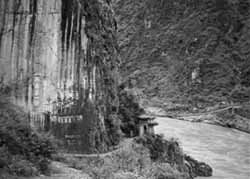
5th February 1942 (Thurs)
Ships Log "06.50 Left Wai Yao? -crossed Salween River-gorge 1 mile deep.
18.30. Arrived Lo Mang 780 Km from Kunming.
Arrangements for the night same as the 4th." [5]
Burma
6th February 1942 (Fri)
Ships Log "08.40 Left LoMang. Stopped for lunch at Lunghing
18.10 arrived Wantung, now Wandingzhen.
18.38 crossed border into Burma.
Contacted members of Burma control Service & Burma Frontier Force.
Spent night at frontier army post-hospitality excellent and re-entry into British territory celebrated in suitable manner." [5]
They were now at the end of the north-east Monsoon season which tends to be dry and mild.
Lt Kennedy "It was a distinct thrill to be back on British territory again after travelling for over six weeks, and we were well looked after at the quarters of the Burma Frontier Force.
The canned beer tasted like nectar and the wireless news, depressing though it was, came direct from London and had a homely touch about it." [9]
L/S Les Barker "We tried to make the frontier today. Stopped at Paoshan for food and proceeded again. Arrived at Wantin the China-Burma frontier at 6pm and stayed in the army billet for the night." [24]
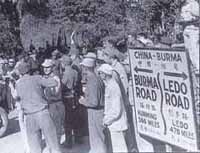 PO Buddy Hide "On the whole of this journey the hospitality of the Chinese was wonderful.
PO Buddy Hide "On the whole of this journey the hospitality of the Chinese was wonderful.
We were passing through the poorest part of the interior of China, but whatever place, no matter how large or small, the people gave us the best they could, of course it was all Chinese Chow, poor class Chinese Chow, which is all rice boiled dry, no milk or sugar, and sufficient meat for one Englishman was shared amongst ten of us; the same with the greens, which was nearly all garlic.
We all became very adept at the use of chopsticks, we had to be or else starve." [21]
Eddie Brazel HKRNVR "One thing which cannot be stressed too much is that throughout our trip the hospitality of both Chinese officials and peasants, as nothing was too much for them to do for us." [46]
PO Prest "The Chinese are allies to be proud of. Whenever we came to a village, dishevelled and without means, we were treated like Princes. The Chinese peasants gave us their huts to sleep in and shared their food with us. The only meat available for eating most of the time was bred and fed 'chow dog,' which was certainly more sustaining than the eternal round of rice and cabbage." [84]
L/St Charlie Evans"I don't know what we would have done for food and drink if it hadn't been for the Chinese." [12]
PO Stonell (MTB 11) "The villages we called at will remain a memory, not because of the hard going, but how good the Chinese people welcomed and treated us." [112]
L/S Les Barker "It was mostly Chinese food – mainly rice – but the people tried to prepare English food wherever they could." [24]
On the Burmese side of the border the party were met by British border guards and more trucks, this time supplied by Dodwell and Co, the International Trader & Shipping Agent that Lt Ashby had worked for as head of their motor division importing American Chrysler trucks and armoured cars, etc. for supply to the Chinese National Govt.
Lt Kennedy "I have been a sort of Marco Polo in reverse. The Chinese could not do enough for us. We were feted right across China.
It was a distinct thrill to be back on British territory again after travelling for over six weeks, and we were well looked after at the quarters of the Burma Frontier Force.
The canned beer tasted like nectar and the wireless news, depressing though it was, came direct from London and had a homely touch about it." [9]
7th February 1942 (Sat)
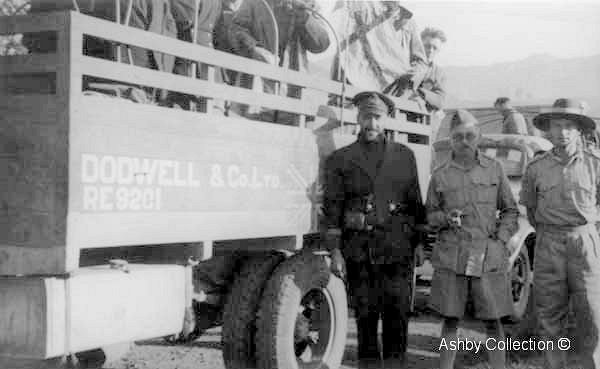 The Dodwell trucks took them another hundred miles to the Burma Road terminus at Lashio, where they were billeted in a near deserted RAF camp and entertained with good food and facilities.
The Dodwell trucks took them another hundred miles to the Burma Road terminus at Lashio, where they were billeted in a near deserted RAF camp and entertained with good food and facilities.
Here they waited five days for orders. While here some acted as firing party at an RAF pilot's funeral. [9]
Left: Lt Ron AShby standing next to a Dodwell truck at the Burma border.
Eve Currie arrived in Lashio on the evening flight from Calcutta and got a taxi straight to the Commissioner, Mr Porter's house, where she had her first of several encounters with Cdr Gandy RN and the escape party..
Eve Curie "In the living room upstairs I found the General who had read my book, two other officers, and a Commander Gandy, of the Royal Navy, who had just escaped from Hong Kong with forty-three men across enemy territory, with the aid of Chinese Guerrillas. The forty-four men were now making their way to Rangoon." [14b]
Lashio was a very cosmopolitan town divided between the old & the new where supplies were stockpiled for onward transport into China.
Lt Kennedy "The old Lashio with its gentle slopes and gardens filled with brightly coloured flowers seemed peaceful and remote from violence, although the war was creeping relentlessly closer every day, but the new town, a collection of shanties had sprung up overnight with the trade boom from the road, was a scene of tremendous activity. " [9]
Eve Curie "New Lashio, the centre of the boom city where the Burma Road started. Six or seven different languages and dialects could be heard, spoken by Burmese, Shan, and Chin customers, primitive-looking peasants from the remote hill tribes, Chinese truck drivers, and white men, English and American, who worked on the road in some capacity or other.
In Lashio any fancy-dress costume would have passed unnoticed. A man could wander about clad as a cowboy of the Wild West, as a coolie, as an Allied General, as a mandarin, as a Hollywood bandit anything went." [14b]
Lt Parsons was hospitalised after a night out. They had most likely been in the ROCAC bar, the main European night spot in Lashio. [9]
Lt Kennedy "During the day we were allowed to go into the new town, but at night it was out of bounds owing to bubonic plague. He (Parsons) had been determined to lead the boys home after a visit to the Lashio Club, and had vanished in the darkness down a slit-trench.
During the day we were allowed to go into the new town, but at night it was out of bounds owing to bubonic plague. " [9]
Eve Curie, Author & Journo "The centre of Lashio's social life was the ROCAC hostel, which belonged to the airline. In the bar of the small rest house one could order drinks, food, listen to an obsolete radio, and, above all, talk - talk with American AVG pilots, with lend - lease officials, with travelling Russian diplomats, with newspapermen in transit, with Chinese, American, and English technicians working on the Yúnnan - Burma railway, and occasionally with some of the military leaders of the Far Eastern war who appeared suddenly from nowhere and vanished the following morning for an unknown destination." [14b]
11th February 1942 (Wed)
Ships Log "At Lashio – Orders received to proceed to Rangoon by train where further orders would be waiting. C. O. (Gandy) flew to Maymyo on reconnaissance flight." [5]
Maj-Gen S W Kirby "Force Viper arrived in Rangoon from Celon. Every man a volunteer, for the "Special Duty" that lay ahead." [96]
12th February 1942 (Thurs)
Ships Log "Received orders to proceed to Rangoon, left by train 23.00." [5]
Due to the overwhelming mass of refugees fleeing Rangoon the trains time tables were running hours late.
Lt Kennedy RNVR"We boarded the train in the late evening, all but the unfortunate Lieutenant Parsons HKRNVR who was lying in hospital with a broken nose." [9]
Lt-Cmd Yorath RN was suffering with severely infected sinuses and was left in the hospital along with Lt Parsons. They were both flown out to Calcutta after recuperating.
13th February 1942 (Fri)
Word had preceded the party to the hilltop station and at Maymyo they were hijacked by members of the Bush Warfare School commanded by Brigadier Michael Calvert. Mad Mike as he was known had served in Hong Kong prior to his posting to Burma where he set up The Bush Warfare School and trained irregular forces in the art of ungentlemanly warfare.
Ships Log "11.15 Arrived Maymyo - whole party including Lt-Cmd Gandy taken off train by Commando guards & entertained at Bush Warfare School.
Then by truck 45 miles to Mandalay, entertained at club and put back on train 18.30." [5]
Eve Curie, Author & Journo "More temples and monasteries of dark red teakwood. More steep hills the colour of rust. A layer of reddish brown dust was now covering my face and clothes." [14b]
Lt Kennedy RNVR "At Maymyo, the last stop before the line left the hill country for the plains, we were invited by the army to lunch at the Bush Warfare School, where new methods of fighting were being studied to counter Japanese tactics.
Arrangements were made that we should go on to Mandalay by road in time to overtake the train there later in the afternoon, but when we eventually left at three-thirty after a delicious lunch of curry followed by strawberries and cream, it looked as though we had cut it too fine. We were relieved to find that the train was still standing in the station when we reached Mandalay." [9]
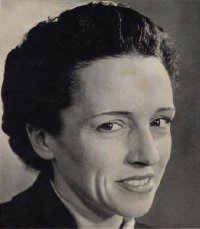 Eve Curie, Author & Journo "Nearer to Mandalay, we began to see British officers, English troops, Indian troops Sikhs and Ghurkhas." [14b]
Eve Curie, Author & Journo "Nearer to Mandalay, we began to see British officers, English troops, Indian troops Sikhs and Ghurkhas." [14b]
L/S Les Barker "Arrived at Maymyo at 1 pm. Had dinner with British soldiers then proceeded to Mandalay by lorry.
Arrived at Mandalay at 4pm and from there went to Rangoon by train again." [24]
Eve Curie, a Polish born French American author, concert pianist, journalist, diplomat and now a war correspondent, working for the "New York Herald Tribune" and "Allied Newspapers", London had caught the train at Lashio, on arrival at Mandalay she alighted from the train to stretch her legs in the late afternoon sun and witnessed Lt-Cmd Gandy RN and his party arrive by truck to continue their journey south to Rangoon. Eve Currie's account of her second brief encounter with the escape party was published in the British press two weeks later. "Waiting for a train was a naval officer in command of motor torpedo boats. He was travelling with 43 officers and men of his unit. All of them had escaped from Hong Kong across Japanese-occupied territory, getting constant help from Chinese guerilla fighters and local Chinese inhabitants. They had fantastic stories to tell but told them reluctantly. They seemed to be solely interested in rushing south and getting hold of new motor torpedo boats and fighting the Japanese again.
A red sun was setting to our right, towards India, as we made our way across the plain that the shadow of the night slowly blurred. It became completely dark. The only thing I saw through the window were scattered fires on the hilltops - the fires that unknown hands lighted every night, all over Burma, possibly as treacherous signals to the enemy." [14a]
"The platform was crammed with Burmese men and women smoking cheroots, some of them squatting on their heels in a posture that seemed almost accrobatic to me, but which they could keep for hours. There were barefoot children, begging, very old men in rags, with very long grey hair, who looked like witches, also begging, English and Indian soldiers in uniform, and bearded Indian civilians wearing huge turbans and white cotton clothes.
Except for the men in uniform, this noisy crowd had no intention whatsoever of getting on that particular train." [14b]
Lt Kennedy RNVR "The train rattled all through the night, but at daybreak we were still some distance from Rangoon." [9]

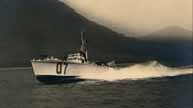
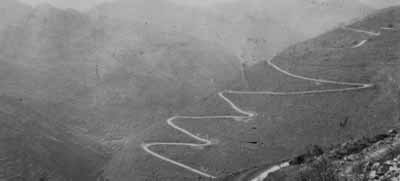
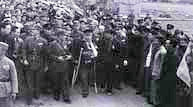




 The Dodwell trucks took them another hundred miles to the Burma Road terminus at Lashio, where they were billeted in a near deserted RAF camp and entertained with good food and facilities.
The Dodwell trucks took them another hundred miles to the Burma Road terminus at Lashio, where they were billeted in a near deserted RAF camp and entertained with good food and facilities.

